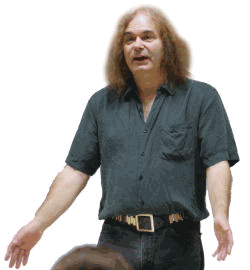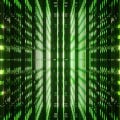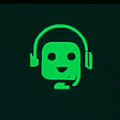Speaker’s Notes
As he promised, Alan Lenton has posted his lecture notes on the ibgames website.
Open Source – Turn on the LAMP

What a challenge for a speaker! We were fortunate enough in our November meeting to hold a joint meeting with, be able to welcome members of, the BCS Open Source Specialist Group (OSSG). Our speaker for the evening, Alan Lenton CTO and ibgames Game Designer, did an admirable job of spanning the broad range of interests and experience with Open Source in the (full) room with a stimulating, insightful and thought provoking talk.
Attendees were welcomed with the traditional cuppa and a bunch of free goodies – Fedora distro CD of Fedora Core4 with a Fedora t-shirt for all, a copy of Linux User & Developer magazine , a Linux Magazine archive DVD with over 4,000 pages of Linux articles and the coveted BCS Oxfordshire branch mug and coaster. (I am sipping my morning cuppa from mine as we speak 🙂
Introduction
I introduced Alan with a recognition of the challenge in the breadth of audience expectations and industry coverage that he hoped to cover. To set the scene some recent milestones in the progress made by open source illustrated by some recent industry reports, such as 1 in 6 web surfers in the USA now do so through Firefox as their browser, the spread of Linux beyond PCs to being embedded in consumer routers and Wi-Fi Access Points (such as the Linksys WRV54G), the announcement of the Open Invention Network (OIN – free registration required) and the news report that a private equity firm is acquiring Ingres from Computer Associates. This last snippet led nicely into the spirit of Alan’s talk. As a Sociology graduate Alan has a particular interest in the social interaction with technology communities. Software businesses that aspire to implement open source strategies effectively need to have a good sense of how to work well with open source communities. In many cases, how one works well with an open source community can be in direct contradiction to what one has learned in 20 years of managing an enterprise software business. It will be interesting to see whether or not Ingres under the leadership of a private equity firm will be able to build a strong community around their product.
Alan kicked off with an overview of the LAMP stack (Linux, Apache, MySQL, and the ‘P’ programming facilities offered by a choice of facilities spanned by the likes of Perl, PHP and Python. He used this foundation to warm up to the main focus of his talk – aspects of developing with, and using, Open Source Software. The talk built on a keynote talk Alan first gave at the ACCU Spring Conference. [The ACCU web site is at http://www.accu.org/]
The talk was aimed at answering the question for developers in a business context wanting to know more about open source, what is this about, and who is it for. The goal was to help programmers and consultants come up with a considered reply when asked whether their company should embrace open source software, and how they should do so. The objective was not to proselytise open source (as Alan said, if that is what you are after just track http://www.slashdot.org, for a few days :). The evening built an open source "tripos" of three legs:

- What open source is
- What open source is good for, and what it is not so good for
- Looking after open source development teams
or looking at three legs of open source as it currently exists from a different perspective :
- open source as a development and applications platform
- open source as a method of licensing software
- open source as a method of developing software
the evening looked at each of these components in turn.
Details
LAMP – covering the spread of Linux options from the various BSDs, thorough the host of popular distros such as Ubuntu, Fedora, SuSE Mandrake, Debian, Knoppix etc. and a number of hardened variants designed for security – such as the USA’s NSA secure variant of Linux.
LAMP – building on Apache as a ubiquitous and function-rich web server – the most widely deployed web server on the Internet and its legendary reliability despite its complexity.
LAMP – standing for MySQL, an open source SQL database, and other open source offerings such as BerkeleyDB, an embedded open source database.
LAMP – The ‘P’ is the scripting language used to bind everything together, and the transition to the developer focus of the talk – taking a quick stroll past Perl., PHP, Python and other options such as Ruby, Bash Shell Script and even Rexx. As well as addressing GNU compilers and libraries, the talk went on to talks through the various distro choices that face the developer and offering some words of advice.

Open source as a method of licensing software – the second leg of our "tripos" with a prácis for developers on some of the ramifications of some flavours of different ‘open source’ licences, categorised into two groups – GNU’s General Public Licence (GPL) and all the rest of the licences.
Open source as a method of program development – with the foundation established the main body of the talk (and clear evidence of Alan’s passion for the topic) – open source as net-enabled, collaborative, incremental development work. Much touted as a new method of working, Alan positioned this as being in fact merely an updated version of a time-honoured way in which craftsmen and artisans have dealt with the alienation of their work.
Open source as a business method – for commercial entities, a killer question – what business model, incorporating open source software, will enable them to make money?
Open Source strengths – from the production of a rick tapestry of excellent development tools as a stepping-stone to developing reliable software.
Open source weaknesses – which looked at weaknesses of open source lie in three fields:
- Choice
- Standards
- Software Patents, Copyrighting and Copylefting
Building an open source project – Alan wrapped-up by looking at how do you build, look after and motivate your developer community, including looking after the developers. He closed stating his belief that open source development is one of the best methods of producing high quality software, and as a reliable platform on which to build your applications. But, and it’s a big but, you must know what you are doing to use it effectively.
Question time – A rich discussion followed driven by audience questions spanning topics as varied as what can be done to promote broader uptake of open source in the mass market, beyond business, to raising the question on wheat and how the principles and spirit of open source software could be applied to the broader world we live in – open source economics, medicine, creative arts etc.
Having called time shortly before 9 PM the level of interest was evidenced by the number of people who went across to the Lamb & Flag pub after the talk was over and continued conversations and debate fuelled by hospitality of the house!
Reflections
My thanks to Alan for leading a splendid evening. As I drive home later that night and mulled over the evening’s conversation it occurred to me, with Alan’s balance of technology and focus on sociological aspects of open source, that I could sum up the spirit of the evening in that wonderful African word "ubuntu". This is for two reasons:
- Firstly, looking at ubuntu is a South African ethic or ideology focusing on people’s allegiances and relations with each other. The word comes from the Zulu and Xhosa languages, and is seen as one of the founding principles of the new South Africa. A succinct translation in English could be "humanity towards others" or more fully "the belief in a universal bond of sharing that connects all humanity." Maybe a better definition was offered by Archbishop Desmond Tutu: "A person with ubuntu is open and available to others, affirming of others, does not feel threatened that others are able and good, for he or she has a proper self-assurance that comes from knowing that he or she belongs in a greater whole and is diminished when others are humiliated or diminished, when others are tortured or oppressed." I would need to look a long time to find a better summation of the potential of the open source movement.
- The second reflection of many of Alan’s points can by found in the Linux distro Ubuntu (and I am letting some enthusiasm and prejudice show here!) which strives to bring the spirit of ubuntu to the software world. From an ‘average end user’ (as opposed to techy) perspective it offers a splendid balance between ‘out of the box’ usability on most hardware I have tried it on. It is not overburdened with complexity whilst still embracing ‘best of breed’ facilities from other open source distros as a foundation for a range of initiatives from a KDE variant (kubuntu) to Education-specific offering (edubuntu).
As I pulled into the drive I was thinking, if we now have a distro for the masses, about one of the inhibitors to broader Open Source uptake – distribution. Access to the global Internet is too expensive, too difficult or just plain impossible for many people across the globe. Even for people who do have access, it can be prohibitively expensive compared to the ease of access we in the UK have to broadband.
With initiatives like Freedom Toaster open-source software kiosks making it possible for people to buy a single DVD-R and to burn Free and Open Source software of their choice, are we on the brink of seeing the spirit of ubuntu having far-reaching impact across the globe…..
The success of Alan’s talk was not just the content and delivery – the power of our branch evenings is the thought-provoking nature of the topics and helping generate awareness, momentum and contributions to our industry. I am certainly glad I was there – thank you Alan!
November 2005


